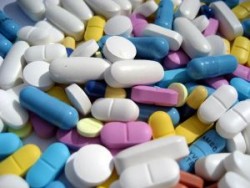The Best Methods of Prescription Drug Detox
As synthetically made compounds, prescription drugs produce powerful effects that gradually interfere with brain and central nervous system functions over time. According to the National Institute on Drug Abuse, when abused, a person can become addicted to prescription drugs just as easily as to illicit drugs like cocaine and heroin.
Once addiction sets in, the damage done to the brain places a person at the mercy of the drug’s effects. For many people, prescription drug detox offers the only viable means for breaking the hold that drugs have over their lives.
With so many different types of drugs on the market, methods of prescription drug detox can vary depending on the type of drug involved. The most commonly abused drug types include:
- Opiates
- Benzodiazepines
- Stimulants

Stimulant-related prescription drug detox require medication therapy approaches.
Overall, the best methods of prescription drug detox work to relieve uncomfortable withdrawal effects while maintaining the overall safety of the patient throughout the detox period. To accomplish this, prescription drug detox programs use medication-assisted detox methods as a means for strengthening damaged brain functions.
Prescription Drug Abuse Effects
Both illicit and prescription drugs produce psychoactive effects that alter neurotransmitter levels in the brain. Psychoactive effects play a central role in driving drug abuse practices.
Prescription opiate, stimulant and benzodiazepines all produce different types of psychoactive effects:
- Opiates act as depressants, slowing down brain chemical processes
- Benzodiazepines also have depressant effects
- Stimulants speed up brain chemical processes
These effects not only interfere with brain function, but also disrupt any bodily functions regulated by the central nervous system. Medications used in prescription drug detox methods address the brain chemical processes most affected by any one drug type.
Medication-Assisted Treatments Used in Prescription Drug Detox
Opiates
Medications used to treat opiate-based addictions work to wean the body off the effects of addictive drugs, according to the Mayo Clinic. In the process, addicts gain considerable relief from withdrawal and drug craving effects.
Medication therapies commonly used for opiate-related prescription drug detox include:
- Methadone
- Subutex
- Suboxone
Clonidine, another commonly used opiate addiction treatment, does not produce opiate-like effects, nor is it an opiate-based drug. According to the National Center for Biotechnology Information, clonidine helps to lessen the severity of symptoms experienced in prescription drug detox without producing psychoactive effects.
Benzodiazepine Detox
Prescription drug detox methods used in benzodiazepine addiction treatment can vary depending on the severity of the addiction. For mild to moderate addictions, detox programs may employ a tapering method designed to wean a person off the drug by gradually reducing dosage amounts over time.
In cases of severe addiction, doctors may switch a person to a different benzodiazepine drug as symptoms of extreme panic and anxiety can develop during the detox stage.
Stimulant Detox
Unlike the medication therapies used in opiate and benzodiazepine addiction treatment, no known medication treatments exist for use in stimulant-related prescription drug detox. Rather than rely on medication therapy approaches, detox programs focus on helping addicts abstain from further drug use by addressing the underlying behavioral components that drive addiction.


 Lorcet Detox Centers -
Although it can sometimes be safe to detox from Lorcet at home, it is not usually recommended and is less effective than professional treatment.
Lorcet Detox Centers -
Although it can sometimes be safe to detox from Lorcet at home, it is not usually recommended and is less effective than professional treatment.  Ativan Detox Centers -
Detox centers are equipped to treat the various withdrawal symptoms that are associated with Ativan dependence and addiction.
Ativan Detox Centers -
Detox centers are equipped to treat the various withdrawal symptoms that are associated with Ativan dependence and addiction.  Concerta Detox Centers -
Without professional detox, Concerta withdrawal can bring on a full-blown psychotic episode, putting the addict and others in danger.
Concerta Detox Centers -
Without professional detox, Concerta withdrawal can bring on a full-blown psychotic episode, putting the addict and others in danger.  Xanax Detox -
Xanax is a drug that is in the class of drugs known as benzodiazepines. These drugs are commonly prescribed for the treatment of various types of anxiety disorder or panic attacks but they have a strong potential to be abused and to cause physical dependence. Xanax, when used either recreationally or as prescribed, can lead ...
Xanax Detox -
Xanax is a drug that is in the class of drugs known as benzodiazepines. These drugs are commonly prescribed for the treatment of various types of anxiety disorder or panic attacks but they have a strong potential to be abused and to cause physical dependence. Xanax, when used either recreationally or as prescribed, can lead ...  Marijuana Detox -
If you or someone you care about suffers from an inadvertent addiction to marijuana, quitting can be tough. Even making the decision to quit smoking pot may not be enough to keep you away from the drug, especially if symptoms of marijuana withdrawal set in and cause undue stress or irritability in your life. Marijuana ...
Marijuana Detox -
If you or someone you care about suffers from an inadvertent addiction to marijuana, quitting can be tough. Even making the decision to quit smoking pot may not be enough to keep you away from the drug, especially if symptoms of marijuana withdrawal set in and cause undue stress or irritability in your life. Marijuana ...